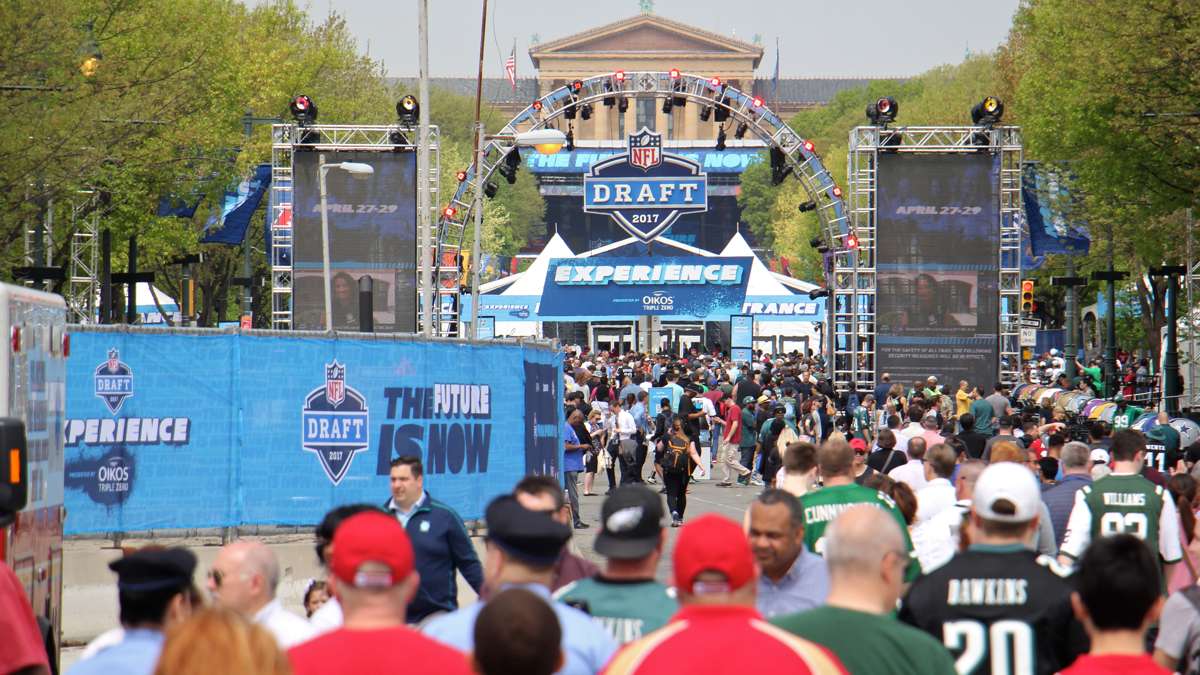In case you missed it: The week’s good reads about Pennsylvania cities

Crowds at the NFL Draft Experience stroll the Benjamin Franklin Parkway on the first day of the NFL Draft in Philadelphia, Pa. (Emma Lee/WHYY)
This week, a state Senate committee passed a bill that could potentially eliminate funding for Planned Parenthood facilities in Pennsylvania; the latest revenues were revealed from Philly’s sweetened beverage tax and the NFL draft came to town.
Senate Bill 300, sponsored by Sen. John Eichelberger, R-Blair, would prioritize “conventional” health care, meaning clinics and hospitals that provide a wider range of services will get more money, according to Eichelberger. Planned Parenthood, which provides services targeted at reproductive health, would get lowest priority.
“People that defend Planned Parenthood are saying, ‘Well, we need money,’” Eichelberger said. “Well, why? They should be justifying why they deserve this tax money if they’re not helping people in these communities to the extent that other agencies can help them.”
Planned Parenthood took issue with the senator’s assertion that the organization doesn’t provide high-quality care.
Soda tax makes money, but misses projections
The latest figures show Philadelphia missed its target for the sweetened beverage tax for March.
Last month, the tax brought in $7 million — about half a million more than it had in February and the highest collection since the tax went into effect in January. But it was still short of the $7.7 million the city’s Revenue Department projected in January.
The tax generated $6.4 million in February and $5.9 million in January. The goal is to make $46 million by the end of the fiscal year in June. Three months in, it’s about 40 percent of the way there. Most of the money is earmarked toward subsidized pre-Kindergarten, community schools, parks, recreation centers and libraries.
Report reveals Harrisburg’s recklessness
A second grand jury convened to investigate Harrisburg’s financial crisis is calling for changes to state laws in its report just released by the state Attorney General’s office.
The 82-page report sheds light on just how reckless some of the decisions were that led to the city’s failed incinerator project and most of its massive debt.
The report also details witnesses’ testimony that former longtime Mayor Steve Reed was aware of project financing risks and strategic weaknesses to which he claimed ignorance while under oath at state Senate hearings in 2012.
Chester recovery strategy: Bring special education students back to district schools
Delaware County’s Chester Upland School District raised taxes last summer for the fourth year in a row, in a long-running attempt to bring the chronically deficit-ridden district back to financial health.
Though the district has asked the state for more money, it figures it’s time to take more responsibility for itself.
Now it’s pinning its hopes on bringing special education students back to district schools from charters — a move that could cut the district’s $7 million dollar deficit by almost a third.
Federal court judge blocks Trump’s threat against sanctuary cities
A San Francisco federal judge ruled this week that the Trump administration cannot withhold federal funds from jurisdictions that call themselves sanctuary cities.
The court issued a temporary ruling because two lawsuits brought by the city of San Francisco and the county of Santa Clara. They say billions of federal dollars that support crucial services were in jeopardy when the administration threatened to cut all federal funds.
The White House released a statement calling the ruling “one more example of egregious overreach by a single, unelected district judge.”
Bloomberg says cities can lead the way on climate change
Despite the Trump’s administration downplaying threat of climate change, Michael Bloomberg, former mayor of New York City, holds a different view. In his book, “Climate of Hope,” co-authored with former Sierra Club chairman Carl Pope, says cities are in a better position to act on a climate-friendly economic future.
Fans have a blast at the NFL draft; others, not so much
The NFL draft kicked off Thursday in Philadelphia on the Benjamin Franklin Parkway. How it went depends on whom you talked to.
Football fans loved it. Some came from all over the country just to watch their favorite team select their next star.
But not everybody was ready for some football.
Fairmount residents have complained about street closures, disrupted public transit, and overall lack of communication and inconvenience. Football was the last thing they wanted to experience — never mind the event took place in their own backyard.
WHYY is your source for fact-based, in-depth journalism and information. As a nonprofit organization, we rely on financial support from readers like you. Please give today.


